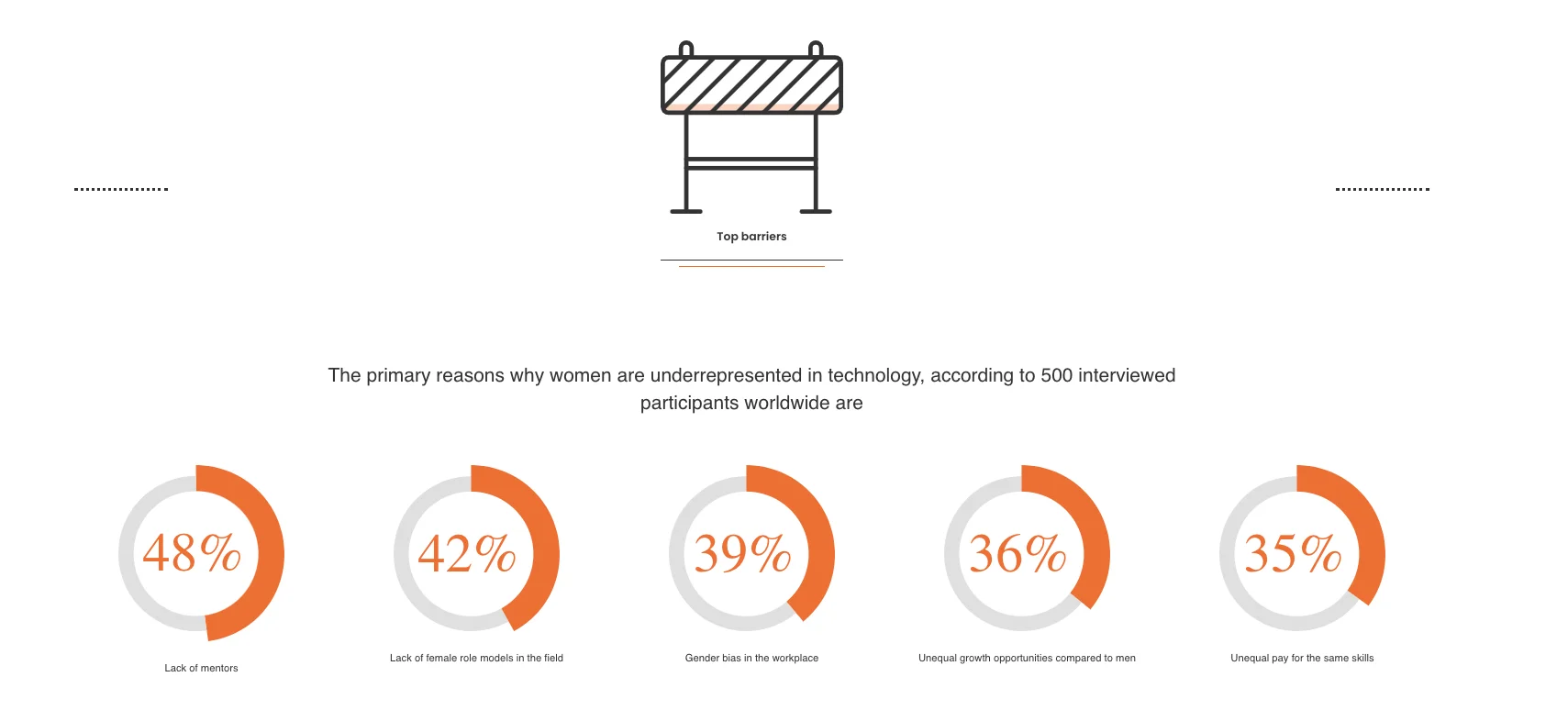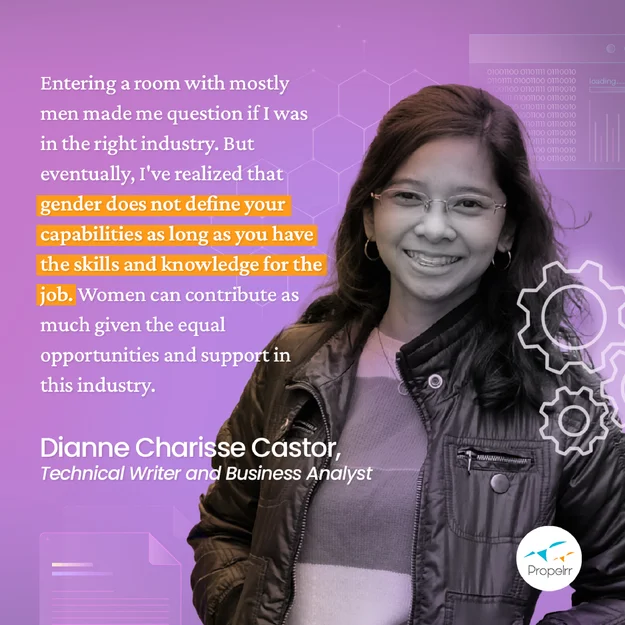Why is There a Need for More Women in the Tech Industry?
Author & Editor
Content Team Lead
Published on: Mar 25, 2022 Updated on: May 20, 2024

Table of Contents
As we march into Industry 4.0, technology is seen as a key industry in addressing the challenges we collectively face. From safeguarding data privacy, eradicating disinformation to reversing climate change, technology will be what tilts our trajectory away from disastrous outcomes.
With this heightened importance put on tech come louder calls to involve more women in technology. Especially if we seek truly inclusive and revolutionary tech.
The industry's gender bias: Why aren't there more women in technology?
In a group of four coders, only one of those is a woman. That's 25% of the workforce in computing and technology, and a figure that dwindles when you look to leadership suites.
According to the State of Women in Tech analysis by Adeva, boardrooms of tech companies see far less representation. At the executive level, only 5% of tech leadership positions are held by women. Only 5% of tech startups are owned by women; a mere 11% of Fortune 500 companies have women in power.
But what might be the most indicative of the industry's gender gap problem is the turnover rate (56%) of women in the field, and the barriers to change.

There are the lack of mentors and role monders, preconceived notions on gender roles and, more importantly, the unequal opportunities in growth and pay between men and women. Collectively, all of this boils down to the problem in women's empowerment and encouragement in the industry.
From these figures and facts, it's tough to just confine the argument to a gender bias, when it obviously isn't just because of that. And this much was echoed by the women in Propelrr's mobile app development and technology team. Ladies who share similar prior experiences, and then some.
We also need to talk about sexism and discrimination
Once, to my dismay, my friend who works in tech told me that he doesn't know a single female colleague who's never experienced sexism and discrimination at any point in her career. So when I spoke to Jamie and Dianne, it saddened me to hear that they shared the sentiment.
It seems as well that, according to Propelrr's technical writer Dianne Castor, even just entering a room filled by men had some effect on her confidence as a tech professional.

"When I was still studying and started working in the technology industry is having confidence issues or underestimating my skills as I see more men in the workplace. Entering a room with mostly men made me question if I was in the right industry," she says.
Jamie our lead iOS app developer, on the other hand, recalls remarks based on antiquated notions that women are relied on only because they are "neat and organized." And, even if it was meant in jest, being a boy isn't a strong enough argument to defend a failure to respect a colleague.
"I remember being told that I should shrug [off] sexist jokes from the team just because 'boys will be boys' during an interview that I had before. There are also instances that we are neat and organized just because we are girls...[and] I would think that all they can think of when they see a woman is that (neat and organized), and that's it. But I hope everyone sees us women beyond that aspect," shares Jamie.
Shifting the perception
In industries dominated by men, constraining the work of women as "accessory" and "auxiliary" is known to happen. Jamie and Dianne's stories are examples of this, and they sharply paint the impact of gender bias in tech.
As Dianne attests, "consciously and subconsciously, [the gender gap] affects how women perform in the workplace." It also ends up discouraging other women from pursuing education in technology.
Minding your own growth while meeting barriers head on can be taxing, after all. And, for most women, pursuing tech careers require a lot of willpower as they challenge the stubborn status quo. If only to prove that "women can contribute as much given the equal opportunities and support in this industry."
As more women continue to demonstrate their value, it's high time for organizational leaders to challenge and change their own perspectives as well.
Because if not, they'll lose out on the benefits of improving women's representation in tech companies.
More women in technology benefits companies and consumers
So what's our buy-in statement? There are many.

For one, various organizational studies point to one fact: Diversity in the workplace benefits businesses. Among them are enhanced productivity, and improvements in company culture, according to Western Governor's University.
Other points to be made in this was underscored by a Forbes column that lists diversity in thinking, revenue growth, and more role models that encourage overall industry development as compelling benefits of a shift.
For hard figures, Adeva points out through their analysis that Fortune 500 companies that have female directors achieved:
- 66% return on invested capital increase;
- 42% return on sales increase, and;
- 53% return on equity increase.
And lastly, from the consumer's perspective, the lack of female representation in the development teams of consumer tech comes ironic to the fact that women are a major economic driving force. This leads to products that lack insight into what women need from consumer tech and other goods.
Dianne expresses agreement with these study findings and those pointing out that having more women in organizations lead to well-rounded decisions. And overall, both she and Jamie assert that women have a lot to offer logical, analytical, and leadership skills. What's more is that they're eager to contribute.
So it goes without saying is the only key left to turn is the one that opens up opportunities for women to grow and thrive in the tech industry.
The future for women in technology
Hesitation is the shadow that hounds you when you've heard it repeatedly said that "this is a job for a man." In tech, many women – more so women of color – have yet to see this change.
Asked if it's still encouraging for women to pursue tech careers, Jamie shares in a hopeful and firm tone: "Most of the opportunities are limitless and there are no rules [dictating] that it is limited based on someone's gender. At the end of the day, what matters are your skills."
If it's skills women in tech have, Dianne references the women in the history of tech. The women who've made some of the widest strides in the industry, then and now. "Women should not have hesitations in entering male-dominated fields.... We already have several women who have proven that gender does not play a role in making great achievements in this field."
She cites female role models in tech one could look up to. She names Ellen K. Pao co-founder and CEO of Project Include, Reshma Saujani founder and CEO of Girls Who Code, Katie Moussouris founder and CEO of Luta Security, to exemplify perseverance and overcoming hardships in the tech industry.
But rather than overpowering one another, Dianne imagines a future of tech where, "we won't hear 'male-dominated' or 'female-dominated' industries as we blur the lines and give equal opportunities across all genders."
Because, after all, building a future for tech and a world that relies on it to solve the developing problems of the world, diversifying our development teams will be the key to inclusive and sustainable solutions.
This requires you to actively listen to voices that have been left out from rooms where the major decisions are made. And for that, we'll first to have these voices in the room, in the first place.
So to you, I ask: Have you opened the door for the ladies in your industry?
Find this story insightful? Let us know your thoughts over on Facebook, X, or LinkedIn. We'd love to know how you think the tech industry can grow to become more inclusive and diverse.
For more stories and updates in technology and marketing innovation, make sure to subscribe to the Propelrr newsletter.
